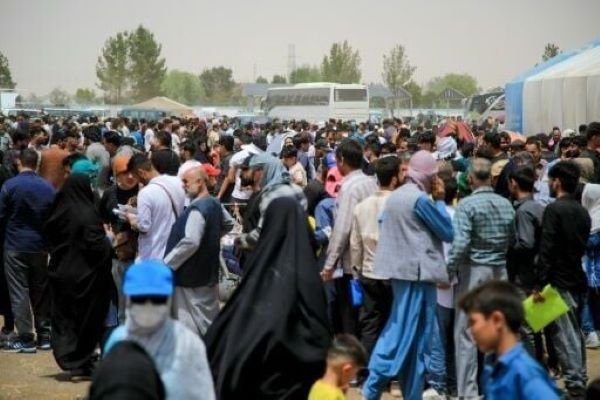Kabul (TDI): Nearly 450,000 Afghans have returned from Iran over the past five weeks, the United Nations reported Monday, following Tehran’s order for all undocumented Afghan nationals to leave the country by July 6.
According to the International Organization for Migration (IOM), between June 1 and July 5, at least 449,218 Afghans crossed back into their homeland, part of a mass return that has created a humanitarian emergency at Afghanistan’s western border.
The figure pushes the total number of Afghan returnees from Iran this year to over 900,000, with tens of thousands arriving daily in recent weeks. On July 1 alone, more than 43,000 people crossed into Herat province at Islam Qala, the UNHCR said, the highest single-day influx so far.
The surge began after Iran announced in late May that undocumented Afghans, potentially as many as 4 million of the 6 million living in the country, had until July 6 to leave voluntarily. As the deadline neared, panic and pressure drove entire families to abandon their homes in Iran, often with little more than what they could carry.
Read More: Russia Gives Afghanistan Full Membership at Upcoming Moscow Format Meeting
“What’s particularly worrying is that one in four returnees is a child,” said Tajudeen Oyewale, UNICEF’s country representative in Afghanistan. He described a shifting demographic from young men traveling alone to whole families, including women, infants, and the elderly, returning under duress.
“Islam Qala is designed to manage 7,000–10,000 people per day, we’re now seeing double or triple that,” Oyewale added. “It’s far beyond anything we planned for.”
In response, humanitarian agencies have rushed to scale up water, sanitation, nutrition, health services, and child-friendly spaces at overwhelmed reception centers.
Read More: Extending CPEC into Afghanistan: China’s Role in Regional Normalization
The crisis has deepened what the UN calls a “chronic returnee emergency” in Afghanistan. Over 1.4 million Afghans have returned so far this year from both Iran and Pakistan, straining already fragile systems.
Massive cuts in international aid have hampered response efforts, and UN agencies, NGOs, and Taliban officials have jointly appealed for increased funding to help resettle the returnees.
Farkhund Yousafzai is an Associate Editor at The Diplomatic Insight.



